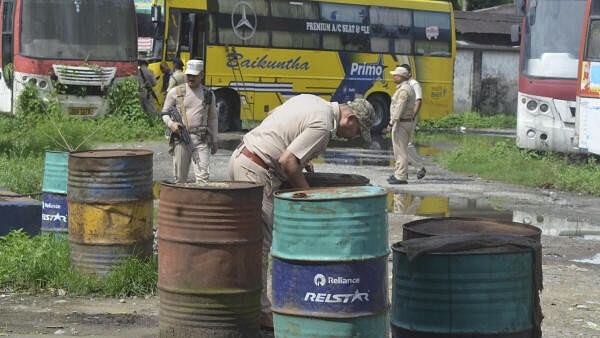
Assam Police personnel conduct a search operation after ULFA (I) claimed to have planted bombs in 19 different locations across, at Chowkidinghee, Dibrugarh, Thursday, Aug. 15, 2024.
Credit: PTI Photo
Guwahati: Born in 1979 with "sovereign Assam" as its demand, insurgent group Ulfa continues to remain a concern despite a "historic" agreement with one faction in December last year and continuous counter-insurgency operations by the security forces.
Just when ruling BJP was making the claim that insurgency in the state is almost over, planting of bombs in at least 24 locations during Independence Day celebrations came as a setback to the party that promised to make Assam an insurgency-free state.
An email sent to media organisations by Ulfa-Independent, the Ulfa faction that is yet to join the peace process, said that the bombs were meant for explosion to register its "armed protest" to Independence Day celebrations but could not be exploded due to "technical failure".
Visibly worried over the incident, CM Himanta Biswa Sarma said such an attempt by the outfit would harm his government's efforts to invite investment to the state where industrialisation remained on the backfoot, mainly due to the long problem of insurgency.
Although Sarma once again appealed to Ulfa-I leader Paresh Baruah to come forward for talks, the incident provided the Opposition parties a chance to target Sarma and police's failure to prevent such a plot.
"The way Ulfa-I planted bombs including in a place close to the Chief Minister's office bore this government's failure to end militancy. Sarma must resign as he is also the home minister," Opposition MLA, Akhil Gogoi told reporters.
Leaders of the now disbanded faction of Ulfa, which signed an agreement in December last year, on Sunday said Ulfa-I even planted a bomb at the house of its leader Anup Chetia. This, according to security officials, suggested that the Ulfa-I is unhappy for signing the agreement with the government without discussion on its "core demand".
What keeps Ulfa-I alive?
A senior officer in the special branch of Assam police told DH that although operations were constantly being carried, mainly in the four districts of Dibrugarh, Charaideo, Tinsukia and Jorhat, where the outfit is still believed to have stronghold, the conflict in neighbouring Myanmar was aiding the outfit.
"Paresh Baruah is believed to be taking shelter in areas along the Myanmar-China border where civilian administration has no control. Those places are completely under the control of insurgent groups. So Ulfa-I cadres are still carrying out unlawful activities in eastern Assam districts and fleeing to their camps in Myanmar. It is not possible to control the outfit until the Myanmar military manages to take control of those areas," he said. The Ulfa-I, according to the officer, at present has around 300 cadres.
Bangladesh situation
The ouster of the Sheikh Hasina government in neighbouring Bangladesh, too, has come as a worry as security experts fear that insurgent groups, including Ulfa-I, operating in the Northeast could get a chance to set up their hideouts if the Bangladesh Nationalist Party government comes back to power.
During Hasina's government, several top leaders of Ulfa including its chairman Arabinda Rajkhowa and general secretary Anup Chetia were caught in Bangladesh and later handed over to India. This paved the way for talks. The Ulfa group led by Rajkhowa was disbanded in January this year after the agreement, which was described as "historic" by the government. But the Ulfa-I faction, led by Paresh Baruah, continues to lead the "armed movement".